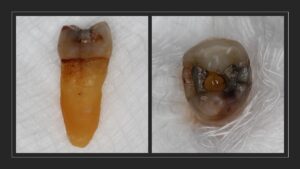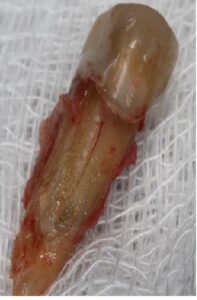Fatigue fracture and how to avoid it happening to my teeth
Last week we got a couple of new patients who came in for help with teeth fracture.
One patient has an existing filling with no prior signs of trouble and she was chewing a piece of soft food.
The other two patients with no filling nor any work done on it in the past, again no prior signs or symptoms that they can remember and they were chewing on relative soft food as well.
Pain or no pain can be associated with this kind of fracture. If the damage is favourable, where the fracture is not too deep nor large, the tooth can be saved. If the damage is too deep or into bone level, the prognosis is not favourable. Tooth saving options depend on case to case basis and we can explain in general info in another post.
Below are a couple of photos for example:

![]()
![]()
A fatigue fracture occurs when a material undergoes repeated stress over an extended period, leading to the development of cracks and eventually failure.
Tooth fatigue fractures can result from various factors, such as bruxism (teeth grinding), malocclusion (misalignment of teeth), or repeated trauma to the teeth.
![]()

To help avoid fatigue fractures in your teeth, consider the following tips:
- Practice good oral hygiene: Maintaining proper oral hygiene, including regular brushing and flossing, can help prevent dental issues that may contribute to fatigue fractures.
- Wear a mouthguard: If you engage in activities that pose a risk of dental trauma, such as contact sports or certain recreational activities, wear a properly fitted mouthguard to protect your teeth from excessive forces and potential fractures.
- Address bruxism: If you grind your teeth while sleeping or during the day, it’s essential to address this issue. Consult with a dentist who may recommend a custom-made nightguard or other appropriate treatments to reduce the stress on your teeth.
- Correct misalignment: Malocclusion can lead to uneven distribution of forces on the teeth, increasing the risk of fatigue fractures. Orthodontic treatment or other dental procedures may be necessary to correct misaligned teeth and ensure proper occlusion.
- Avoid excessive force on teeth: Avoid using your teeth for tasks they aren’t designed for, such as opening packages, biting on hard objects like pens or ice, or chewing on non-food items. Be mindful of your eating habits and opt for foods that are tooth-friendly.
- Regular dental check-ups: Regular visits to the dentist allow for early detection of dental issues and timely intervention to prevent potential fractures. Dentists can identify signs of wear, stress, or structural weakness that may lead to fatigue fractures.
Remember, if you suspect any dental issues or experience symptoms like tooth pain, sensitivity, or fractures, it’s crucial to consult with a dentist promptly. They can provide a proper diagnosis and recommend appropriate treatments or preventive measures based on your specific situation.
#cairnsdentist #cairnsfamilybusiness #familyfriendly #totalcaredental #totalcaredentalboutiquecairns #totalcaredentalboutique #cairnssmallbusiness #cairnsbusiness #supportsmallbusinesscairns #cairnsemergencydental #cairnskids #TCDB #dentistcairns #cairnsdental #cairnscentral #fractureteeth #crackteeth #crackedteeth #dentalemergency #toothachedentist



